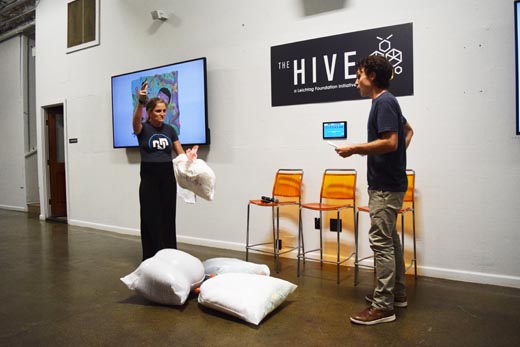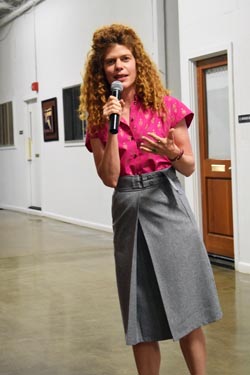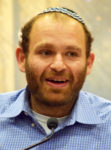By Donald H. Harrison

ENCINITAS, California – Up and down San Diego County, Jewish congregations and organizations are beginning to embrace the celebration of Tu b’Av, a relatively unknown holiday in the United States, but considered to be the equivalent of Valentines Day in Israel. This secular year, it arrived on the evening of August 15 and continued to sundown on August 16.
The Hive, located at the Leichtag Commons, celebrated Tu b’Av on Thursday evening, Aug. 15, with a presentation of stories of biblical couples, mixed with related stories from members of the audience. This was followed by a dramatic reading by Samantha Ginn and Paul Eddy of New Village Arts of Carlsbad of a scene from Almost, Maine by John Cariani about a woman who symbolically returned to her longstanding male companion bags and bags of love he had given her, and demanded that since he was unwilling to take the next step in their relationship, he should give back all the love she had given him.

At Tifereth Israel Synagogue in San Diego, Rabbi Joshua Dorsch e-mailed to his congregation a video link of Cantor Hanan Leberman of Jerusalem singing a song about Tu b’Av, which we embed above this article. And, Rabbi Rafi Andrusier of Chabad of East County offered some thoughts about what couples should do before marriage.

Chaya Gilboa, an Israeli-born educator working as director of Jewish engagement at Leichtag Commons, told about 50 attendees that the origin of Tu b’Av is a very sad, awful act of violence, but that what was done in subsequent years in response to that violence set the pattern for the annual celebrations.
Judges 19-21 tells the story of a man whose concubine ran away from home after being accused of unfaithfulness. He retrieved her at her father’s home, and passing through the land of the Benjaminites, he stopped in Gibeah at the home of a stranger. That night a mob surrounded the house and demanded that the man be sent out, for they wished to sodomize him. Instead, the concubine was sent out and the mob raped her all night, killing her. The man cut up his concubine into 12 pieces and sent a piece to each of the 12 tribes. This prompted the other Israelite tribes to demand that the guilty parties be turned over to them for execution, and when the Benjaminites refused, a war broke out. There were massive casualties on both sides, leaving many Benjaminites without prospects for marriage.
Asked to reverse the ban, the Israelites refused, but offered a way for the men of Benjamin to find wives. According to Judges 21:19-22 (as translated in the Stone edition of the Tanach):
They said, “Behold, there is a yearly holiday unto Hashem at Shiloh, which is north of Beth-el, east of the road going up from Beth-el to Schechem, and south of Lebonah. So they directed the sons of Benjamin, saying, “Go and lie in wait in the vineyards. And see; and behold, if the daughters of Shiloh go out to perform the dances, you shall emerge from the vineyards, and each of you grab his wife from the daughters of Shiloh, and go to the land of Benjamin. It shall be that if their fathers or brothers come to protest to us, we will say to them, “Be compassionate toward [the Benjaminites] for we did not capture a wife for each man in the war, and because you didn’t give the [wives] to them, so that you should incur guilt now.”
A footnote explained that as the daughters of Shiloh were “taken” and not “given” away, the ban on intermarrying with the Benjaminites was not technically broken.
Gilboa said the custom of young women dressing in white and dancing hoping to be chosen as brides is the foundation of the Tu b’Av celebrations.
In Jerusalem, where she is a ninth-generation resident of the city, she said, there are many kinds of events focusing on love, or the lack of it. For example, “last year, there was an event in which people told of their broken hearts” to a playwright who translated their stories into dramatic scenes to be performed on stage.
Elsewhere in Jerusalem, she said, romantic tours are arranged to places mentioned in books by popular Israeli authors such as Amos Oz.
Outside of Jerusalem, “there are communities, kibbutzim, that have special dances in the vineyards to remember that time.” She added that in the age of the Me Too movement, and feminism, the story of the rape and the battles today are largely forgotten, subsumed under the more romantic image of “women dancing in the vineyard with their beautiful dresses.”
Still, she said, there is one tradition in which “the beautiful women sing ‘look at me, what you see on the outside is inside,’” whereas the plain women sing, “‘don’t look at the outside; I am beautiful on the inside.’”
After attendees took a tour of the Coastal Roots farm at the Leichtag Commons, they gathered at the Lillian Rice designed farmhouse – which once had been the home of the flower-growing Ecke family of Encinitas – where Gilboa led an interactive discussion about love in the Bible and love in modern times.
She told several famous biblical stories, such as that of Rebecca, coming to Isaac’s village to be married to him, and seeing him for the first time. She got off her camel and covered her face with a veil.
Gilboa asked if anyone in the audience had a story to share about a first meeting or a blind date. One man said he stopped at a reception desk to get directions to the place where he would have a job interview. The young woman behind the desk had the most “amazing eyes,” which were all he could think about during the interview. He may have blown the interview, he confessed, but he ended up marrying her almost 33 years ago.
Another man confided that he met his wife via the Internet, and that they sent VHS tapes back and forth to each other. After they finally met in person, they decided it was right to marry.
Giboa next related the story of David and Bathsheba, telling how David had Bathsheba’s husband Uriah sent into the heaviest part of a battle so he could be killed, and David could then marry her. Did this remind anyone of a story from their own lives?
One man said his mother wore alluring dresses, attracting the attention of a man who saw her over an office partition. Although he was married, they made love, “and they had me!”
A gay man said that he had a first date with a fellow who was still living with his ex while they waited out their lease. When he saw the ex, he was instantly attracted. “Today,” he commented, “is my five-month anniversary with his ex, who is now my boyfriend.”
Another biblical story was that of Jacob having to work seven years for Laban before he could marry Rachel, only to have Leah substituted for Rachel at the wedding because it was not the custom then for the younger daughter to marry before the older one. Then Jacob had to work for Laban seven more years before he could marry Rachel. Gilboa asked if anyone in the audience had a story of waiting for a love.
One woman said she had two husbands in her life, the first for 21 years, and then after a long wait, her current husband. She commented that the words “wait” and “weight” especially apply in such a situation when one longs for a companion.
Another woman said that her mother and father divorced. Her father remarried and her mother had significant others, but after 20 years, they got back together again and remarried. Her father eventually realized that his first wife “was the one.”

At Tifereth Israel Synagogue, Rabbi Dorsch circulated the following message from Cantor Leberman, who comes from Jerusalem to San Diego to lead the congregation in High Holy Day prayers.
Leberman said:
I wrote the song “Tu b’av” a couple of months after I finished my army service. I was frequenting Jerusalem’s local springs (ma’ayanot), and I wished to convey the atmosphere around Israel’s ma’ayan culture – hiking with friends to simply spend time in the beautiful nature of Israel.
The verses describe “a typical evening at a Jerusalem spring” on the one hand, and the holiday of Tu b’Av on the other. In the times of the Temple, unmarried women would borrow each other’s clothes and go up to the highest point north of Jerusalem to find a match. Why did they wear borrowed clothing? They did this so that the men could not tell which tribe they were from; it was an equalizer.
The chorus – “You’ve got to listen to her song, whispering through the birds that everyone belongs” – refers to one of my favorite teachings. Namely, that because birds fly in the heavens, they speak with heavenly wisdom.
To me, on Tu b’Av and all year round, the birds are whispering to me clearly that in this holy place called Jerusalem, no matter your faith, “EVERYONE BELONGS”.

Rabbi Rafi Andrusier of Chabad of East County selected the day of Tu b’Av to offer some advice on how to create a marriage that will last.
He wrote: “[W]hen two young singles meet, they should find out about each other’s values, discuss their priorities, explore their character. Their habits may change, but their character won’t change much. And if they later discover that he likes to sleep with the window open and she needs it closed – people with good character who are committed to the relationship will be able to work that one out.”
*
Harrison is editor of San Diego Jewish World. He may be contacted via donald.harrison@sdjewishworld.com